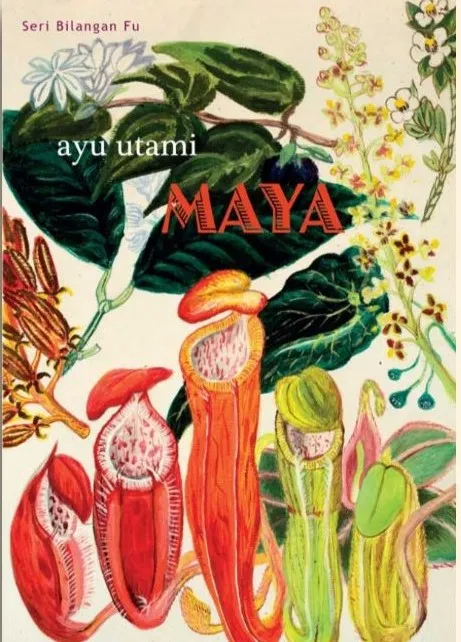Maya

Author: Ayu Utami
Category: Fiction, literature
Language: Indonesia
Publication Year: 2013
Pages: 249
Description:
After two years of Saman being declared missing, Yasmin receives three letters from her secret lover. Along with the letters, Saman also sends a piece of agate. To unravel this mysterious event, the usually rational Yasmin is forced to visit a spiritual teacher, Suhubudi, who is Parang Jati’s father. At Suhubudi's hermitage, Yasmin becomes involved in another event that turns out to be a spiritual journey for her to understand herself, her love, and her country—while Parang Jati unravels the mystery of Saman's whereabouts. This story is set against the backdrop of the 1998 Reformasi movement.
"Maya" by Ayu Utami is a novel that skillfully blends mythology, spirituality, and modern life's complexities into a narrative that is both intriguing and thought-provoking. This book takes readers on a journey through the interplay of reality and illusion, exploring themes like identity, faith, and the nature of truth, all set against the backdrop of Indonesian culture.
The story revolves around Maya, a character whose name fittingly means "illusion" in Sanskrit. Her journey isn't just a physical one but also a metaphysical exploration of what is real and what is not. Maya is a woman searching for her place in the world, grappling with personal and societal expectations, while also dealing with the mysteries of her own existence. The novel is set in a contemporary Indonesian setting but is deeply rooted in the country's rich spiritual and mythological heritage, which adds layers of depth to the narrative.
Ayu Utami does a fantastic job weaving in elements of Javanese mythology and mysticism throughout the story. The novel doesn’t just tell a story; it also delves into philosophical questions that have puzzled humanity for ages. What is reality? What lies beyond our perception? How much of what we experience is shaped by our beliefs and desires? These are some of the questions that "Maya" subtly poses to its readers.
The narrative style is lyrical and reflective, with Utami's prose offering moments of poetic beauty. She doesn't shy away from exploring the more complex and darker aspects of the human psyche, which gives the novel an edge. Her writing is richly descriptive, drawing readers into the lush landscapes of Indonesia and the inner landscapes of her characters' minds. It’s almost as if she uses words to paint a canvas where the mystical and the mundane coexist in a delicate balance.
"Maya" is also a commentary on modern Indonesian society, touching on issues such as gender, religion, and the tension between traditional beliefs and contemporary values. Maya, the protagonist, is a strong, independent woman who questions the norms and expectations placed upon her. Through her eyes, the novel challenges the reader to think about the roles women play in society and how they navigate the often conflicting demands of tradition and modernity.
What makes "Maya" particularly engaging is its ability to keep readers guessing. Just when you think you have a handle on what’s happening, Utami throws in a twist that makes you question everything you’ve read so far. The narrative is nonlinear, shifting between different times and perspectives, which adds to the sense of disorientation and keeps the reader on their toes. It's a bit like walking through a dense forest where every path leads to a new revelation or a deeper mystery.
Humor isn’t a predominant feature in the novel, but Utami does employ a subtle irony throughout the story. There are moments where she pokes fun at the absurdities of life and the quirks of human nature, which brings a lightness to an otherwise profound narrative. This subtle humor helps to balance the more intense philosophical elements, making the novel an enjoyable read despite its deeper thematic concerns.
"Maya" is not a light read in the sense that it requires the reader to think and reflect. It’s the kind of book that you might find yourself pondering long after you’ve turned the last page. It’s rich in symbolism and metaphor, and each reading could reveal new insights that you might have missed the first time around.
In summary, "Maya" by Ayu Utami is a beautifully written novel that deftly combines mythology, philosophy, and social commentary. It’s a book that challenges perceptions and invites readers to question the nature of reality itself. With its blend of mysticism and modernity, it offers a unique reading experience that is both enriching and captivating. If you're looking for a novel that will take you on a journey of the mind and spirit, "Maya" is definitely worth picking up.
Personal Notes:
This book is my favorite work by Ayu Utami. Ayu unveils a world hidden from the general public's view—or rather, deliberately concealed. The explicit scenes are shocking, but such is human nature, unpredictable and difficult to comprehend.
Back to Home